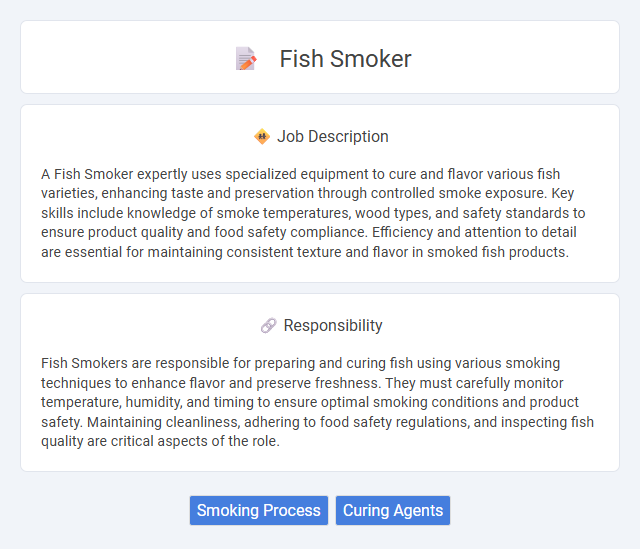
A Fish Smoker expertly uses specialized equipment to cure and flavor various fish varieties, enhancing taste and preservation through controlled smoke exposure. Key skills include knowledge of smoke temperatures, wood types, and safety standards to ensure product quality and food safety compliance. Efficiency and attention to detail are essential for maintaining consistent texture and flavor in smoked fish products.
Individuals with strong attention to detail, patience, and the ability to work in warm, smoky environments will likely find fish smoker jobs suitable. Those who tolerate repetitive tasks and enjoy hands-on work outdoors or in semi-enclosed spaces may adapt well to this role. People sensitive to smoke or with respiratory issues might face challenges and may not be ideal candidates for fish smoking positions.
Qualification
Fish Smokers require expertise in selecting high-quality fish species such as salmon, trout, or mackerel and knowledge of proper curing and smoking techniques to ensure optimal flavor and preservation. Proficiency in operating various smoking equipment, monitoring temperature and smoke levels, and maintaining hygiene standards is essential to produce safe and marketable smoked fish products. Experience with food safety regulations, including HACCP protocols, and strong attention to detail are critical qualifications for maintaining product consistency and consumer safety.
Responsibility
Fish Smokers are responsible for preparing and curing fish using various smoking techniques to enhance flavor and preserve freshness. They must carefully monitor temperature, humidity, and timing to ensure optimal smoking conditions and product safety. Maintaining cleanliness, adhering to food safety regulations, and inspecting fish quality are critical aspects of the role.
Benefit
Working as a fish smoker likely offers benefits such as improved understanding of traditional preservation techniques and the potential for steady employment in the seafood processing industry. Employees might experience health advantages from working with natural smoking processes compared to chemical preservation methods. There is probably an opportunity to develop specialized skills that can increase job security and future career prospects within food production sectors.
Challenge
Working in a fish smoker job likely involves constant monitoring of temperature and smoke levels to ensure product quality, presenting a consistent challenge for precision and attention to detail. The probability of encountering issues like uneven smoking or contamination requires quick problem-solving skills and adaptability. This role may also demand physical endurance due to prolonged exposure to heat and handling of heavy equipment.
Career Advancement
Fish smokers can advance their careers by developing expertise in various smoking techniques and flavor profiles, leading to supervisory or quality control roles. Mastery in food safety regulations and product innovation opens opportunities for managerial positions within seafood processing companies. Continuous skill enhancement and certifications in aquaculture and culinary arts significantly increase prospects for senior roles in the fish smoking industry.
Key Terms
Smoking Process
The fish smoking process involves curing the fish with salt or brine followed by exposing it to smoke from burning wood chips at controlled temperatures, enhancing flavor and preserving the fish. Precise temperature and humidity control during the cold or hot smoking stages is critical to ensure optimal texture, moisture retention, and safety. Skilled fish smokers select appropriate wood types, such as alder or hickory, to achieve balanced smokiness that meets quality and regulatory standards.
Curing Agents
Fish smokers use curing agents such as salt, sugar, nitrates, and nitrites to enhance flavor, preserve texture, and prevent bacterial growth during the smoking process. These curing agents facilitate the dehydration of fish and inhibit the growth of spoilage microorganisms, extending shelf life. Proper application of curing agents ensures an optimal balance between taste, safety, and product quality in smoked fish production.
 kuljobs.com
kuljobs.com